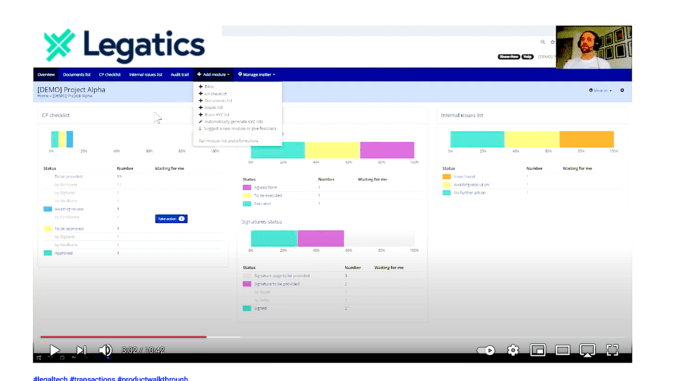
There’s a growing interest in deal management tools. One of the better-known ones is Legatics, which launched in 2015 and is still motoring along and expanding the platform. Here, in this AL TV Product Walk Through, Chief Commercial Officer, Dan Porus, takes us through the key elements of what Legatics can do.
Today, its clients include a growing roster of top firms, such as: Allen & Overy, Herbert Smith Freehills, Hogan Lovells and Eversheds Sutherland, to name a few.
The first thing that is apparent from the walk through is just how complex the deal closing process is for lawyers, whether for a finance or M&A transaction, with so many moving parts it makes your head spin. The idea of doing this kind of work without a digital deal management tool to help keep track of things is therefore really quite daunting – at least for the more complex deals that major firms work on.
As Porus, a former lawyer, explains, the key challenge is that when different parties in a complex deal email information back and forth to each other as the transaction progresses, the data sheets they’re sending are ‘out of date’ almost as soon as they are sent.
The confusion that can be created by email then drives the parties to have lengthy conference calls to ensure that they are all ‘on the same page’, as it were. But, this further slows down the process.
And, that’s just the start of it. As Porus shows, there are other challenges that Legatics has been designed to tackle in relation to deal completion. Therefore Legatics aims to keep everyone on one platform, right to the end of the deal. This is more efficient, reduces risks around missing data, and prevents confusion about where a deal has got to.
(Press play to watch/listen inside the page, approx. 10 mins.)
Another thing that struck this site was that even a 10 minute walk through has not covered all this platform can do. But hopefully this is enough to give you a good idea of what is possible.
The last thought is: how did lawyers do deals before tools like Legatics arrived? The answer is probably: very slowly, and with many operational challenges that no doubt did not please the lawyers having to do this kind of work, or the clients waiting for the deal to close.